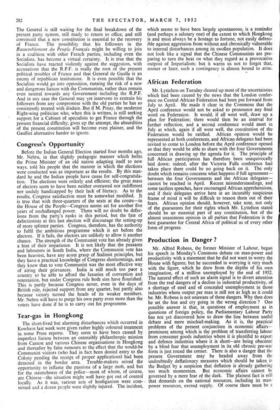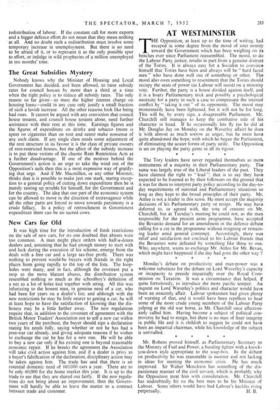Production in Danger ?
Mr. Alfred Robens, the former Minister of Labour, began his speech in Monday's Commons debate on man-power and productivity with a statement that he did not want to worry the House with figures; but he succeeded in worrying it very much with the figure, which he drew from the depths of his own imagination, of a million unemployed by the end of 1952. The natural effect of such an alarm signal is to divert attention from the real dangers of a decline in industrial productivity, of a shortage of steel and of concealed unemployment in those industries where output per man is still not as high as it could be. Mr. Robens is not unaware of these dangers. Why then does he set the hue and cry going in the wrong direction.? One possible answer is that, in questions of employment as in questions of foreign policy, the Parliamentary Labour Party has not yet discovered how to draw the line between useful debate and mere mischief-making. As it is, the practical problems of the present conjuncture in economic affairs— prominent among which is the problem of transferring labour from consumer goods industries where it is plentiful to export and defence industries where it is short—are being obscured by a blind fear that unemployment in its old chronic pre-war form is just round the corner. There is also a danger that the present Government may be headed away from the undoubtedly deflationary measures which should be taken in the Budget by a suspicion that deflation is already gathering too much momentum. But economic affairs cannot be governed by a mere fear of the dark. The plainest fact is still that demands on the national resources, including its man- power resources, exceed supply. Of course there must be a redistribution of labour. If the constant call for more exports and a bigger defence effort do not mean that they mean nothing at all. And no doubt such a redistribution must involve some temporary increase in unemployment. But there is no need to be afraid of it, or to represent it as the only possible spur to effort, or indulge in wild prophecies of a million unemployed in ten months' time.



































 Previous page
Previous page